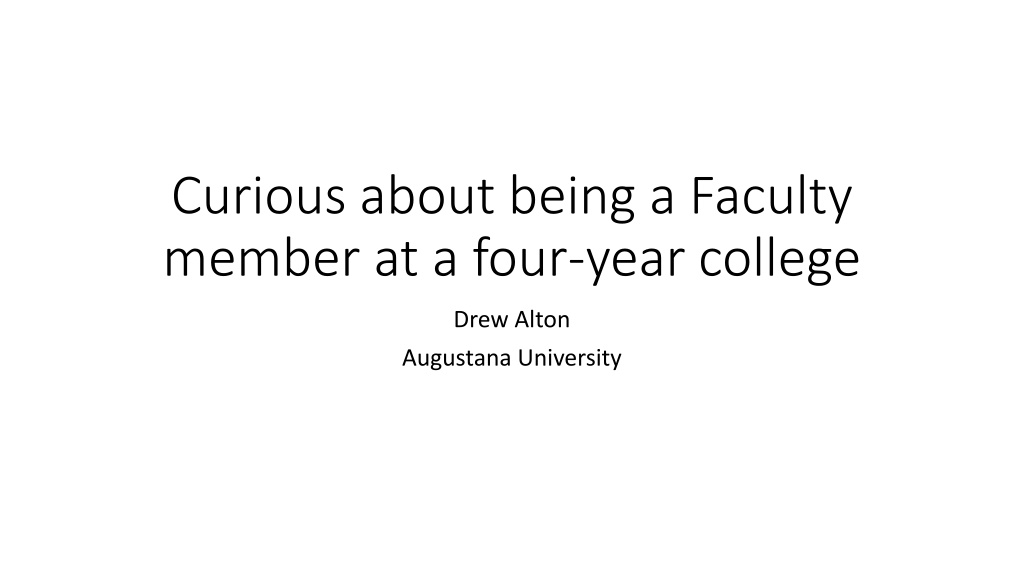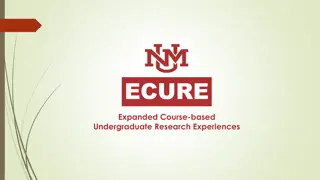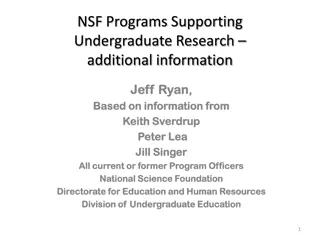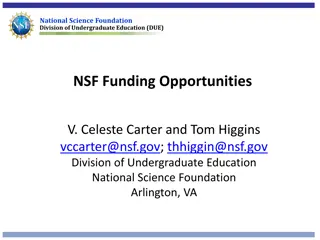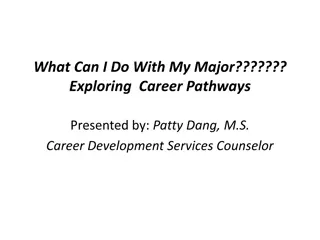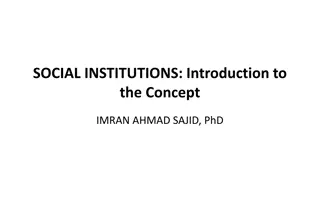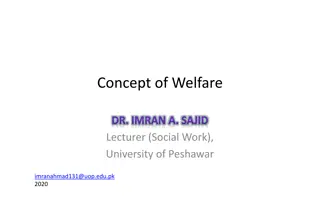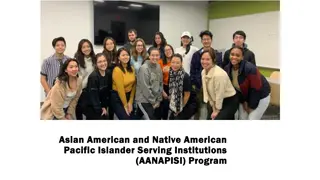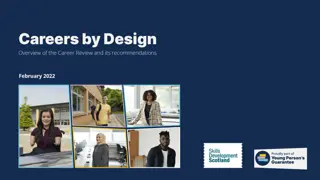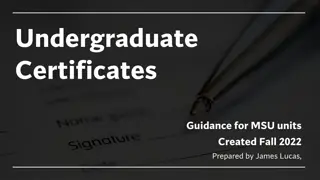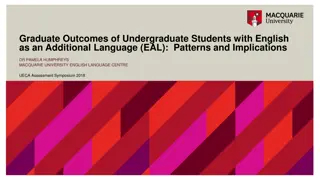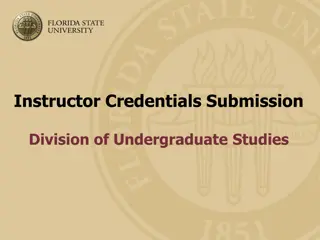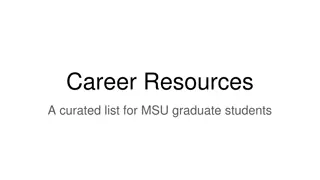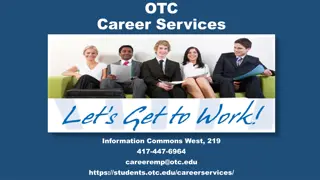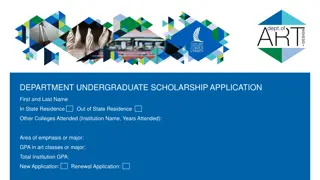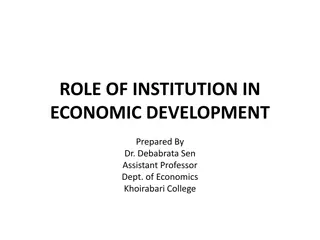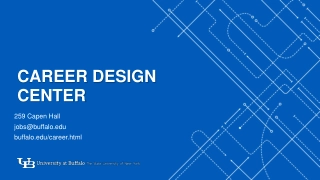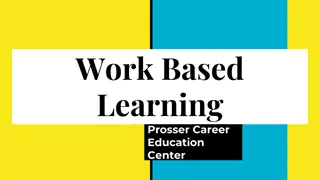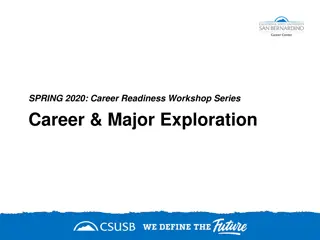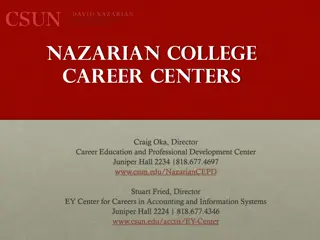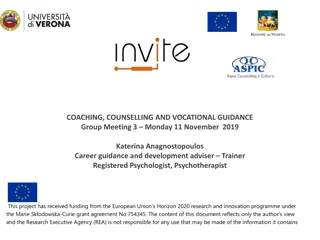Exploring a Career in Primarily Undergraduate Institutions (PUIs)
Delve into the unique aspects of being a faculty member at a primarily undergraduate institution like Augustana University, including differences from R1 universities, job search challenges, lower pay scales, and the rewarding personal connections with students that make teaching at a PUI so fulfilling. Gain insight into the academic versus industry career paths and the freedom and balance offered in academia. Discover the educational journey and research experiences of a physics professor and the reasons behind the attraction to teaching at a PUI.
Download Presentation

Please find below an Image/Link to download the presentation.
The content on the website is provided AS IS for your information and personal use only. It may not be sold, licensed, or shared on other websites without obtaining consent from the author. Download presentation by click this link. If you encounter any issues during the download, it is possible that the publisher has removed the file from their server.
E N D
Presentation Transcript
Curious about being a Faculty member at a four-year college Drew Alton Augustana University
Outline A bit on why A bit about myself What is different about a primarily undergraduate institution(PUI) What is different about the job search for a PUI
Need to be aware of this These jobs won t pay as well as an R1 university. I ve had a student who was just about to graduate and excited about taking a job tell me his salary. It was about $10k more than my salary at the time. When I took this job I had an offer from BoA for twice my 9 month salary.
Industry or academia? How to choose your Industry or academia? How to choose your path path May have seen this article earlier this month by Joanne Zajac https://physicsworld.com/a/industry-or-academia-how-to-choose- your-path/ She suggests these four major differences: Working style (Team vs solo, industry being team) Management (Academic being mostly self directed) Work-life balance (Industry having more of a home life) Actual tasks involved (industry being more product oriented) Academics at a PUI has more freedom on this, and the work-life balance is definitely more under your control.
My Education and Research BS in physics with math minor from University of Iowa (1992) An REU at U of Notre Dame in superconductivity Two years off to find myself MS from Ball State University (1996) Thesis on FNAL E683 Fixed target Photon-Nucleus scattering PhD from Kansas State Univeristy (2000) Thesis on NuTeV. Neutrino production of charm. Postdoc University of Michigan (2000-2006) D worked on Fiber Tracker and Diboson physics Professor (Assistant 2006-2012, Associate 2012-2020, Full 2020- Continued D0, Added DarkSide, and a couple years ago joined DUNE
Why do I like this? For me the biggest draw is the personal relationship with the students! If you went to an R1 institution as an undergrad you may never have seen this. I have most physics majors in at least three classes before they graduate I have students who graduated 12 years ago that still reach out and let me know how they are. I had a student who was only in my Physics I and II class send me an email 10 years later telling me how I had changed her life. She graduated with plans of med school and now has a PhD in Geophysics. She s the most dramatic example, but I have been told something like this by many students.
So what is a primarily undergraduate institution like? Much more teaching. A lot more variety in what the institution expects It offers more freedom on things like location It won t pay as well Research funding won t be as plentiful but can be just as available.
Teaching Load Not like an R1, where you can go semesters or years without teaching (except sabbatical) Teaching load at my school is suppose to be 3-1-3, but labs reduce that. Typically I teach 2.3-1/2-1.5 When looking one job I phone-interviewed for had a load of 4-4. I decided that was too much. Very likely that you will teach across the physics curriculum but also you re likely to need to teach outside the physics curriculum Lab science for non-majors First year seminar Capstone, honors program, etc
My teaching this year Fall Physics 1-calc based 3 hrs lecture and two-2 hour labs total of 30-40 students Computational Physics Survey of Calc 3, DE, linear Algebra and Matlab 3 hours, 5-10 students Co-teach Intermediate Lab, 3-7 students January Electronics for Scientists and Engineers, 3 hours lecture, 3 hours lab each day, 10 students I love this class but hate teaching it in January Spring Analytical Mechanics (Junior level) 3 hours lecture, 9 students Teaching release from a grant Co-teach Advanced Lab, 3-7 students
Variety in what they expect See the teaching load Research Some places don t expect any at all, some places like Augustana expect research during the summer but almost nothing during the school year Advising It s very likely you ll advise students who are physics majors May need to advise students who are undecided/exploring Committee duties Standing committees like curriculum council, task forces on revamping Gen Ed, etc
Location When I applied for R1 institutions, I applied to places in England, Canada, across the USA For the PUI, I only applied within about a 7 hour drive of mine and my wife s home towns. Most R1 institutions were looking in a specific specialty and if it was particle physics they had a specific subspecialty in mine and possibly a specific experiment (Particle physics, neutrino physics or collider physics even CMS not Atlas) Most PUIs are looking for someone with teaching experience, they want you to at least pretend you ll do some research but that means basically if they re in your chosen geography you have a chance
Research Funding Research Corporation for Scientific Advancement has grants for physics professors in their first 3 years and at PUI. NSF has programs specifically for PUI. All the tenure/tenure track faculty at AU have NSF funding. This is unusual but I think it s because we can help each other that it s worked for us. Some states are EPSCoR states, these are states which don t get very much federal research funding, and thus they have a pipeline to money only for them. I chose South Dakota because of plans for DUSEL which has become SURF. My institution also has internal grants. The first two years, I got those to support me getting my program started. They were $7000. So it s possible to get some money. The NSF grants have been $20,000/year up to $70,000 a year. You (probably) won t have a post-doc but you can support a few undergrads and a month or two of summer salary and a little travel
Job Search Where you apply is different as mentioned How you apply is also different How the interview goes is going to be different .. Before all of that What experience they want you to have is different
What to do before you start to apply Any teaching experience I knew I wanted the teach my original plan for my BS was a high school teacher So I helped teach a high school class of 5 Anything you do beyond I taught a lab class my first two years of grad school will help. Tutor (Mathnasium, Varsity Tutors, etc) you ll make a bit of money but it also separates you from everyone else If you can adjunct a class at a local college it ll be even stronger. Undergraduate Mentor If you want to go somewhere that research is even slightly relevant get some experience mentoring an undergraduate in research. During my MS, I got to do this once During my PhD I helped with one and got to be the primary mentor of another During my Post-doc I had another
Where to apply First, where to find jobs Don t bother with the particle physics rumor mill or Insprire hep jobs APS job site https://www.aps.org/careers/employment/index.cfm and physics today are good options. Most physics departments will advertise there. The Chronicle is another option https://jobs.chronicle.com/ . Sometimes deans don t listen to the department on where to advertise. I grew up in Iowa, that was my goal location, I found all the schools in the state with a BA/BS in physics and found the Human Resources page of them and bookmarked them.
The Application Make contact before you apply Find the department website How many faculty are there? Does it look like they are really doing research? Can you get an idea of teaching load? If the add mentioned contacting someone and they are in the department, it might be worth a phone call/email. It might allow you to customize your material to their job. What you send typically Cover letter, CV Research statement maybe or maybe it s in cover letter Teaching statement This is probably new
Do NOT send generic stuff DO NOT send the Research statement you wrote for Michigan State They know you can t do the same things. High light that you have experience advising undergraduates in research In the teaching statement, highlight any experience you have If you aren t familiar with active learning, find out about it, don t claim to be an expert at it, but show them you ve done some homework and tell them what you want to try. It might be worth mentioning that the AAPT has a New Faculty Workshop and you d like to do that once you are a new faculty (It s a great experience!!) Do not screw up the Dear Dean Fredrick Keep in mind that almost certainly a non-physicist is reading these applications.
The Interview Often there are phone interviews (probably Zoom now) before an on- site interview. This is because smaller schools don t have the money to bring out 5 candidates. I found someone I knew at a small school and did a practice phone interview. On a phone interview feel free to ask how many people they are interviewing on the phone and how many they ll bring out for on-site interviews. Asking about the timeline is fine, let them know that you realize things might slip. For two of my interviews I was the only candidate they were going to bring to campus (It was mine to loose). Small places are more likely to try in the fall. When we did we hoped to interview in the fall and have an offer out by Christmas.
Questions Ask now Ask later drew.alton@augie.edu After you get
